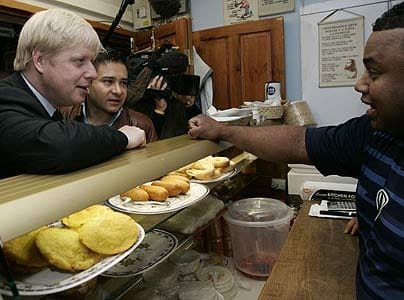On Thursday 12th March, Boris Johnson made a strong statement on the looming impact of coronavirus in the UK, calling it “the worst public health crisis for a generation” and warning that “many more families are going to lose loved ones before their time”.
It is hard to believe that was just over a month ago. This month has been unusual for everyone and brought extreme hardship for many, including the Latin Village community.
Followers of the campaign will know that all the Latin Village traders are all from BAME backgrounds – mostly, but not exclusively, from Latin America. Many are refugees. Many have multiple protected characteristics. The BBC recently reported that, in the UK, coronavirus appears to disproportionately impact people from ethnic minority backgrounds. If this is true of the disease itself, it is multiply true of the economic and societal aftershocks that ripple through communities. As so often happens, those that can least afford to bear the blows are hit the hardest.
We write today to share our story of one month during the coronavirus pandemic.
Our experiences are a stark illustration of how this crisis is not a great leveller, as it is sometimes described. They show, in miniature, the enormous difference in power between small businesses and large corporations. How the actions of these organisations, both of individual staff and the collective company, can inflict chaos and distress on hundreds of BAME people, and in turn, all the family members, and the community, they support. It is a story of how our community relies on the government officials elected to represent our interests, and how vulnerable we become when their attentions are drawn elsewhere.
In times of crisis, the choices we make matter. They can show us for who we truly are; they can become our legacy. Today, we wish to outline the choices made by stakeholders that supposedly work in partnership with the public sector. To highlight the impact their choices are having on BAME communities. And to ask, taking all this into account, whether the public stakeholders landowners Transport for London (TfL) and the Mayor of London, Haringey Council still believe they have chosen the best deal for the local BAME community.
—
On Thursday 12th March, the day of that press conference, 10 people had died of coronavirus in the UK, but there were clear signs of an impending crisis. The World Health Organisation had just declared coronavirus a global pandemic. We were told the UK was two weeks behind Italy, the first European nation to be placed under lockdown.
The British public reacted with mass panic-buying causing food shortages.
That same day, Latin Village traders met with Deputy Mayor of London, Joanne McCartney, and landowner TfL to discuss concerns about the future of the market. At that meeting, TfL promised they would do everything they could to keep the market going.
That was Thursday 12th March. What a difference a weekend makes.
By Monday 16th March, there was a power cut to all traders which was forseeable and could have been prevented by TfL. As there is no natural light in the Latin Village in Seven Sisters Indoor Market, traders are forced to work in the dark while losing perishable food stock. As the week passes, there is still no power. During a time of frantic panic buying and food shortages, when traders should have been ideally placed to serve their communities, providing basic essentials and culturally-specific goods, they were struggling to function at all.
By the following Monday, 23rd March, the government ordered the closure of non-essential shops. Notably, this excluded “market stalls which offer essential retail, such as grocery and food”, and in relation to restaurants, it was recommended that “food delivery and takeaway can remain operational.” The market operators seemed to agree, advising traders the market would remain open, since “many report increased sales as Shoppers seeking an alternative to Supermarkets. The shorter supply chain of Market retailers means they are less subject to delivery delays.”
Also on Monday 23rd March, in the middle of this unprecedented health crisis, Grainger PLC writes to traders drawing attention to their loss of legal appeal against the forced move to Apex House and the demolition of the Latin Village. They advise traders of plans to move them by the end of the year. Save Latin Village had only learned of the legal outcome on 17th March, three working days earlier. Grainger PLC found time to consider to the court decision and to agree that, despite the global pandemic, there would be no changes to their plans. They did not find time to enquire after the welfare of traders or arrange for additional support to help them through the disruption. Under the proposed scheme, Grainger PLC will be the ultimate owners and stewards of the new Indoor Market.
On Tuesday 24th March, the market operators order closure of the Latin Village. According to traders, market operator staff communicated this decision with uncommon relish, telling traders “you no longer have a future here, the electricity is not going to be fixed, you have already lost everything, and you’ll have to adjust to the new rules when you’re moved”. This wildly insensitive and unprofessional statement comes from an agent of a public-private partnership, the market operator appointed by TfL. Nor is it unexpected; TfL are aware of the long-standing and well-documented pattern of discrimination, victimisation and harrasment. And still their agent remains within the public-private partnership.
By the end of March, UK supermarkets report their best month on record, with grocery sales up 20%. Essential culturally bespoke food outlets in the Latin Village remained closed.
At this point, the virus has also spread widely. The UK is ordered into nationwide lockdown. Nearly 3,000 people have died. Many of us start to hear of people we know, who have caught the disease. Hospitals are straining with the increased admissions. The chief medical officer, the health secretary, and even the prime minister, all report being infected with coronavirus.
At the Latin Village, on 1 April, trader Fabian (pictured above with Boris Johnson) is admitted to hospital in an ambulance. Fabian had no pre-existing health conditions that we are aware of, yet remains in a grave condition, in intensive care, nearly a month later. At the time of his hospital admission, Fabian had been in a years-long race discrimination claim against private-public partnership agent and market operator, with the support of David Lammy MP. Recent news reports and Harvard University research has cited a link between high stress and lower immunity to infectious diseases, including coronavirus. Fabian’s ordeal before his hospital admission can surely not have helped.
On 8th April, Haringey Council emails the business community outlining the local government support available to them.
However, since some traders do not have access to email or facilities to open Word documents, they require physical letters. The agents only proposed solution, on 9th April, is to advise traders to visit Latin Village to collect these letters, in exchange for the keys to their shop units.
So just to reiterate:
- 12 March: TfL says they will do everything possible to keep the market open
- 16 March: Power is cut to the site, traders working in the dark and dealing with spoilt food
- 17 March: We learn from our legal advisors that the latest CPO appeal has failed
- 23 March: Agent advises market should remain open, echoing government advice. Power still cut.
- 23 March: Grainger PLC contacts traders to announce plans to proceed with forced move by the end of the year drawing attention to loss of court appeal against demolition.
- 24 March: Agent orders market closure. Staff treat traders with great insensitivity, taking the opportunity to highlight the difficulties they are facing, rather than offering support. Power is still cut.
- 1 April: Trader Fabian rushed to intensive care in an ambulance, with severe coronavirus symptoms. All traders still without electricity or income.
- 9 April: Traders invited to collect letters for local government support grants in person, in exchange for handing over their keys. Fabian remains in intensive care. All traders still without income. No power to the site.
That was one month, all during a global pandemic.
…
With the closure of the Latin Village, all traders are left without income, and currently, it is unclear how businesses will survive the next few months.
In the UK, Latin Americans are not officially recognised as an ethnic minority group. In equal opportunities questionnaires, and the 2011 census, most Latin Americans identify themselves as ‘other’, as there is currently no category to describe them. This does not mean that their presence, or the challenges they face, are insignificant. In 2013, it was estimated that there were 250,000 Latin Americans living in the UK, mostly in London, comparable to the British Asian population in the early 1990s, when census ethnicity data was first captured. Numbers today are likely to be much higher, given Latin Americans are one of the fastest growing ethnic groups in the UK. In addition to their relative invisibility, Latin Americans face other challenges. They face significant language barriers. They are proportionally over-represented in jobs with long but fragmented hours, particularly cleaning. And a 2011 study found that the median wage among Latin Americans was lower than the London Living Wage.
During a time when we are urged to show solidarity and good faith, Latin Village traders have been treated with shocking insensitivity, a lack of not only professionalism but also basic human decency.
This would be unacceptable treatment of any community, but it is happening to a particularly vulnerable BAME community. This would be unacceptable at any time, but it is happening during a global pandemic. This would be shocking coming from a private company, but this is a public-private partnership. It involves public bodies who are supposed to represent the interests of traders, and who are allowing this mistreatment to happen, and to keep happening.
…
Early on in the pandemic, The United Nations released a statement in relation to the Covid-19 outbreak which stated that some may find “emergency powers attractive because it offers shortcuts.” and “At this time, we need to push back against those who seek opportunistically to use the crisis to further their position”.
The pattern of decision-making by the private agents in their dealings with Latin Village has been consistent. At best, their approach under-prioritises the needs of the community. According to MP David Lammy there have been “allegations that might amount to fraud and which ought to require police involvement”.
We can only speculate as to the intentions of the private-public partnership in the choices they have made. But all of us are free to judge their actions and decide whether we consider the private stakeholders trustworthy stewards of this important cultural asset, and the livelihoods of hundreds of people in a vulnerable ethnic minority community.
Many traders believe that the current COVID-19 crisis is being used as a short cut to achieve a private-public partnership development agenda. On the face of recent behaviour, it is hard to argue that this is an irrational position. The relationship between traders, and this public-private partnership agent, was already extremely poor, has now been eroded beyond repair.
…
This also brings us back to the question of choices, and of legacy or future generations. It leaves us with questions for TfL and the Mayor of London.
On Thursday 12th March, TfL was going to do everything in its power to keep the market open. On Thursday 9th April, traders were being asked to hand over their keys. In the meantime, TfL has been in contact with traders, to discuss PAT testing of electrical appliances, but not the more critical matters of the power cut, or the closure of businesses, or the continuing demands for traders to pay rent. What happened?
Following the closure of the Latin Village, TfL offered their lessee the option to suspend their rent payments at Seven Sisters Market, providing these benefits were passed on to traders. At the time of writing, their lessee has still not passed on this benefit. They have failed to reinstate electricity to the site. They reportedly used the crisis as an opportunity to taunt traders. There are also serious and long-standing complaints about their conduct, including allegations of harassment, race discrimination, etc. TfL has the power to remove their agent and lessee, so why are they still in place?
Grainger PLC’s conduct during the Covid-19 pandemic has been no less revealing. Following the appeal decision, Grainger PLC quickly moved to communicate their plans to relocate the market by the end of the year, despite the coronavirus crisis. There has been little sympathy for the unprecedented challenges that traders face. There has been no support in restoring power or preparing for the future partial reopening of essential food shops within the Latin Village, so traders are still without income. Under the proposed development plans, Grainger PLC will be the owner of the new indoor market, despite having no prior experience of market ownership. Does the Mayor of London believe Grainger PLC can be trusted as the future owners, and therefore the ultimate stewards a valued cultural and registered community asset?
We have always believed there is a more sustainable alternative than the Grainger PLC plan. Our campaign has always centred around a Community Plan, a viable option, with planning permission, which has sustainability and community at its heart, as well as jobs, commerce and housing. To date, the Mayor’s Office has not provided us with the right to effective participation to present our Community Plan with incorporates the majority of the UN Sustainable Development Goals. After recent events, we believe it is imperative to reassess the risk of relocating the Latin Village, as per the Grainger PLC plan.
COVID-19 has changed everything and shown that our Community Plan which incorporates most of the UN Sustainable Development Goals is the blueprint for a new shift. In the UN’s latest report “COVID-19 and Human Rights: We are all in this together” it outlines that “when we recover, we must be better than we were before”.
The Mayor of London and Haringey Council have the power to veto this plan. Before it is too late, we ask – will they consider the alternative?




